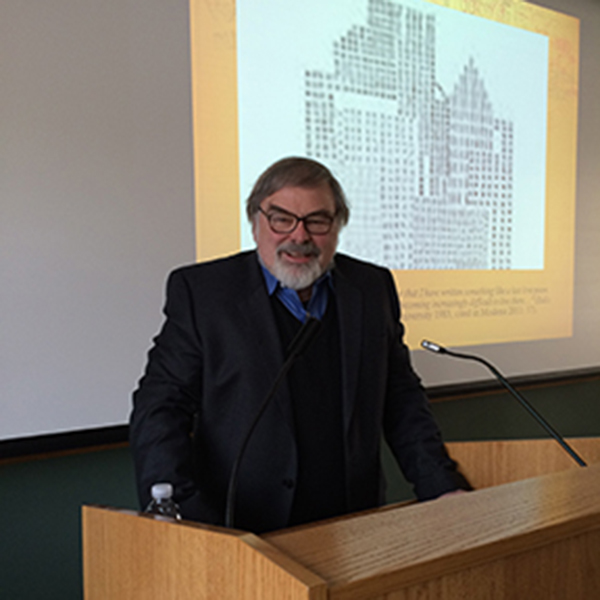Gary W. McDonogh

Contact
Academic Departments
Education
Ph.D., Johns Hopkins University
M.A., University of Toronto
B.A., Yale University
Areas of Focus
The global city; comparative globalization; Barcelona; Chinatowns around the world; suburbia
Biography
One of the dilemmas of teaching about the global city entails learning to deal with the experience and ideas that we bring to urban issues. For many of us, the city is not only an abstract concept but also a place of life, family, friends and memories where our profound engagement with everyday metropolitan knowledge sometimes keeps us from seeing the way issues, conflicts and meanings may be negotiated in other urban circumstances. My goal in teaching about cities is to develop "hometown knowledge" and commitments by challenging students with a deep and critical examination of global forms of urban life and consciousness. Through these, students may seek new ways of understanding problems and solutions by exploring the choices that other urbanites have dreamed of and fought for. Together, then, we can find new visions, evaluate them and share them with others with whom we share goals and commitments of local and global citizenship that last long after Bryn Mawr. In my research, writing and teaching, the challenges and discoveries of cities, then, provide a continual renewal of challenges and interests.
Over the last few decades, I have explored many cities worldwide through perspectives drawn from anthropology, geography, social history, planning and mass media/cultural studies. This intimate knowledge of cities in turn provides foundations for teaching classes thematic courses on urban social and cultural issues and classes that guide students into comparative exploration of urbanism. Barcelona, Spain, has been the cornerstones of my work since the mid-1970s, in works as diverse as the monograph Good Families Of Barcelona (Princeton, 1986), the edited volume Conflict In Catalonia: Images Of An Urban Society (Florida, 1986) and Twelve Walks Through The History Of Barcelona (Ajuntament de Barcelona, 1993) as well as numerous other articles in Spanish, French, Catalan and English. My foci in Barcelona include the nature of class conflict and divisions within the city, from 19th-century capitalist expansion to the issues of contemporary third-world migration or questions of nature and spatial justice.
As an anthropologist, I have also felt it equally important to reflect on issues in American society as well. I spent a decade working in Savannah, untangling painful relations of race, class and religion in a deeply divided society, listening to narratives, resistance and adaptations that African-Americans created in relation to the sacred and secular power structures around them. This resulted in the monograph Black And Catholic In Savannah, Georgia (Tennessee, 1993) while I also edited a critical yet previously unpublished WPA manuscript, The Florida Negro, including contributions from Zora Neale Hurston. I also became the senior coeditor of The Encyclopedia of Contemporary American Culture (Routledge 2001). Of late, my primary American research has grappled with issues of suburbia and its cultural meanings as part of a global comparison.
The fascination of world cities has also taken me to Hong Kong and East Asia, including a year as a Fulbright lectureship in American Studies program at Hong Kong University (1996-1997). In 2005, this longterm relation resulted in a monograph, Global Hong Kong (Routledge) co-authored with my wife, Cindy Hing-Yuk Wong. We continue to work together on a longer term project on comparative globalization evident in the form, meanings and media of global Chinatowns, where we have conducted research in Europe, Latin America, North America and Australia in addition to our Asian experiences. Here we are interested in globalization as seen from multiple perspectives, including Chinese agency and articulation through Hong Kong, hybridization with multiple local groups, and changing flows and meanings.
My current projects continue to combine these projects to find new and creative understandings of cities as dynamic human creations and as spaces facing real and pressing problems. In November 2008, for example, I brought my concerns with globalization back home to Barcelona with a new monograph on the millennia of global expansion and experiences of the peoples of the Iberian peninsula in Europe, Africa, Asia and the Americas –Iberian Worlds (Routledge 2008). I am also completing a co-edited ethnographic collection on Global Downtowns which includes my work on Chinatowns (and why they are near but not in so many downtown areas). And in classes and research, I continue to explore myths –the paradigms through which we read and act -- and diversities of suburbs worldwide in social history, form, and fictions, whether the banlieues of Paris, the new towns of Hong Kong, the gated communities of China and Buenos Aires or shanty towns of the Global South, learning from my colleague Juan Manuel Arbona. In dialogue with my colleague Ellen Stroud, I am also exploring cultural definitions of nature that link studies around cities to concerns of our growing connection to Environmental Studies.
All of these cities, people, texts and issues continually come up in my classes and interactions with student research. The broad overview of the introductory course, City 185 – Urban Culture and Society, – where students read about Manchester, Barcelona, Cusco, Paris, New York and Los Angeles as well as Philadelphia is complemented by students' field research in Greater Philadelphia. City 229, Comparative Urbanism, focuses each year on a few key cities for in-depth research on topics like colonialism and post-colonialism, environmental issues or race and migration. Here, students can work with the college's rich collections on Barcelona, Hong Kong, Los Angeles and other cities. Advanced classes may focus on issues like the city and film or questions of public space and public citizenship. These reach fruition in the collaboration of senior theses students and post-thesis discussions and internships.